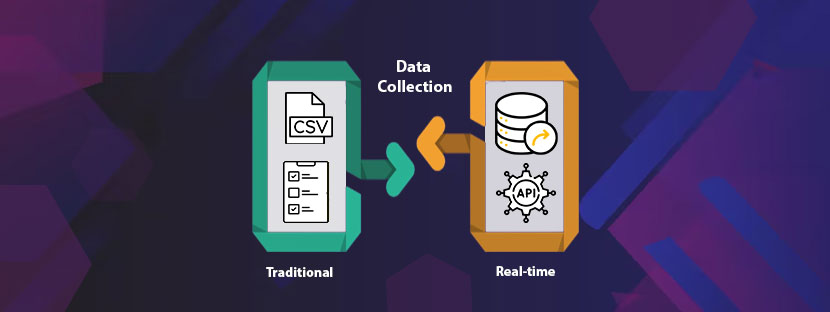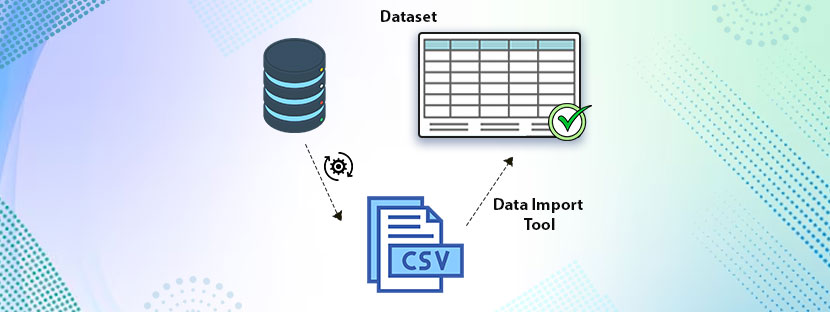Data is vital, rather lifeblood to run a successful business operation. Every business organization has its own special way of collecting and processing data. Probably you must have your system. But anyway, if you are looking for data collection challenges and solutions, you landed in the right place.
Usually, data tells businesses about customer behavior, market trends, operational capacity improvement strategies, and many more things. To get the right type of data, you need to have the right data collection strategy. Well, sometimes irrespective of having the best strategies, still businesses face challenges while collecting data. Let’s talk about those challenges and try to address them with some logical solutions in this blog.
Get it STARTED now!
Importance of Data Collection for Business Operations
Data collection is the first step in making effective business decisions and strategy development. It shows businesses directions on which they can set goals. Collecting accurate data and analyzing it properly can help businesses avoid costly mistakes and deliver better results. Following up with an effective method is crucial for collecting relevant information. Often businesses face data collection challenges and solutions they never get on time. To come out of that situation, you need a strong strategy, which we’ll discuss later in this piece.
When you collect the right data, your business can expect;
A better understanding of customer
Get to know why your customers want to buy your products. Plus, understand why your customers prefer your products rather than taking other similar products. When you understand your customers’ behaviors, you can serve them with a better experience.
Improve your offerings
Considering the latest performance data helps provide better offerings. You can easily increase the value of your existing products and make an impact in the market. Serving more user-friendly and useful products is possible if you have the right amount of data with you.
Better sales and marketing campaigns
The latest insights are vital when you run ADs. Using data collection techniques, you can get all relevant data from your campaign and use them to boost your strategies. For example, you can cut some of your newsletter receivers if unsubscribe rates increase. It always alerts you in all your marketing steps.
Identify new opportunities
Getting constant data always helps you find new opportunities and explore new things. You can have all data with you if you stay constant with your data collection procedures. Having a fixed and error-free data collection process is crucial and you need to utilize it completely.
Types of Data Collection Challenges and Solutions

Maintaining Data Quality Intact
Businesses collect data from different points at different times. Updating all collected data at frequent intervals is important because each data comes with an expiry tag. If not updated on time, it can lead to poor data quality, and later on, it turns into bad data. Most often businesses face data quality issues while and after collecting data.
Sometimes quality issues occur while recording the data (while doing the data entry part). To improve the data quality issues and minimize data entry issues, you can rely on any partner. Get data collection services to manage everything without compromising on data quality matters. Or, you can trust any software to automate data cleaning and improve quality. However, it’s best to invest in human expertise for better results.
Ensuring Data Security & Trust the Data
Providing robust data security to collected information is an absolute necessity. Not just during the collection, you need to ensure proper storage of the data. Security is one of the major data collection challenges and solutions are non-negotiable. From data storage to disposal, a lifecycle of data is extremely important. For your reference, data breaching incidents have increased over the past years and it’s not remained a rare case nowadays.
Traditional ways to ensure complete data protection are no longer been in the game. A multifaceted approach has taken place to ensure complete data security. It involves using encrypted data transports, access controls, and other forms of advanced security mechanisms. Deploy all these advanced mechanisms to protect your data from unauthorized access.
Managing High Data Volumes
Running businesses needs huge volumes of data to perform different functions. They deploy different measures and tactics to collect data in bulk volumes. However, all efforts can go to waste if you don’t manage data volumes perfectly.
Having a flexing infrastructure to accommodate heavy data collection is important. The size of your database must be increased at par with the amount of data you collect. If physical database enhancement is not possible, you can switch to could platforms. This way you can mitigate data volume problems in data collection challenges and solutions for that.
Channelizing and Integrating the Data
Presenting a complete picture of the business operations is one of the main reasons for collecting data. You may have collected and stored the required amount of data in different sources. But to process them, you need to unify them. Otherwise, your team will be unable to see the complete picture and therefore make half-baked decisions.
The creation of a unified data architecture can curb data collection challenges and solutions generated. You can create it at your organization or you can bring it from third-party applications. Always check whether your data points are getting connected seamlessly and transported into multiple channels or not.
Ensuring High Standard Privacy to Data
After collecting data, you’ll end up having vital and sensitive customer information at your end. So, you need to establish data principles to ensure maintaining data privacy to your data. This becomes crucial at this point because the number of data breaching incidents is increasing at a sharp rate.
The best solution here is to follow CCPA and GDPR protocols to ensure complete protection of your sensitive data. Plus, you can move one step ahead, you can anonymize your sensitive data using data masking techniques. It’s one of the best ways organizations protect their database from external appearances.











